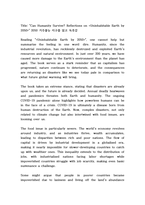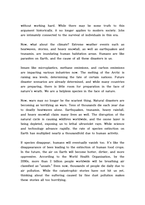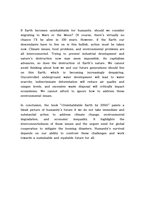2050 거주불능 지구를 읽고 독후감 영작
Reading "", one cannot help but summarize the feeling in one word: dire. Humanity, since the industrial revolution, has recklessly destroyed and exploited Earth's resources and natural environment. In just over 200 years, we have caused more damage to the Earth's environment than the planet has aged. The book serves as a stark reminder that as capitalism has progressed, nature continues to deteriorate, and the consequences are returning as disasters like we see today pale in comparison to what future global warming will bring.
The book takes an extreme stance, stating that disasters are already upon us, and the future is already decided. Annual deadly heatwaves and pandemics threaten both Earth and humanity. The ongoing COVID-19 pandemic alone highlights how powerless humans can be in the face of a crisis. COVID-19 is ultimately a disease born from human destruction of the Earth. Now, complex disasters, not only related to climate change but also intertwined with food issues, are looming over us.
The food issue is particularly severe. The world's economy revolves around industry, and as industries thrive, wealth accumulates, leading to disparities between rich and poor nations. The flow of capital is driven by industrial development in a globalized era, making it nearly impossible for slower-developing countries to catch up with wealthier ones. This inequality extends to the distribution of jobs, with industrialized nations facing labor shortages while impoverished countries struggle with job scarcity, making even basic sustenance a challenge.
Some might argue that people in poorer countries became impoverished due to laziness and living off the land's abundance without working hard. While there may be some truth to this argument historically, it no longer applies to modern society. Jobs are intimately connected to the survival of individuals in this era.
Now, what about the climate? Extreme weather events such as heatwaves, storms, and heavy snowfall, as well as earthquakes and tsunamis, are inundating human habitation areas. Humans are like parasites on Earth, and the cause of all these disasters is us.
Issues like microplastics, methane emissions, and carbon emissions are impacting various industries now. The melting of the Arctic is raising sea levels, determining the fate of certain nations. Future disaster scenarios are already determined, and while many countries are preparing, there is little room for preparation in the face of nature's wrath. We are a helpless species in the face of nature.
Now, wars may no longer be the scariest thing. Natural disasters are becoming as terrifying as wars. Tens of thousands die each year due to deadly heatwaves alone. Earthquakes, tsunamis, heavy rainfall, and heavy snowfall claim many lives as well. The disruption of the natural cycle is causing wildfires worldwide, and the ozone layer is being depleted, exposing us to lethal ultraviolet rays. While science and technology advance rapidly, the rate of species extinction on Earth has multiplied nearly a thousandfold due to human activity.
If species disappear, humans will eventually vanish too. It's like the disappearance of bees leading to the extinction of human food crops. In the future, the air on Earth will become hotter, dirtier, and more oppressive. According to the World Health Organization, by the 2090s, more than 2 billion people worldwide will be breathing air classified as "unsafe." Even now, thousands of people die daily due to air pollution. While the catastrophic stories have not hit us yet, thinking about the suffering caused by fine dust pollution makes these stories all too horrifying.
If Earth becomes uninhabitable for humanity, should we consider migrating to Mars or the Moon? Of course, there's virtually no chance I'll be alive in 100 years. However, if the Earth our descendants have to live on is this hellish, action must be taken now. Climate issues, food problems, and environmental problems are all interconnected. Trying to prevent industrial development and nature's destruction now may seem impossible. As capitalism advances, so does the destruction of Earth's nature. We cannot avoid thinking about how we and our future generations should live on this Earth, which is becoming increasingly despairing. Uncontrolled underground water development will lead to water scarcity, indiscriminate deforestation will reduce air quality and oxygen levels, and excessive waste disposal will critically impact ecosystems. We cannot afford to ignore how to address these environmental issues.
In conclusion, the book "" paints a bleak picture of humanity's future if we do not take immediate and substantial action to address climate change, environmental degradation, and economic inequality. It highlights the interconnectedness of






 분야
분야


